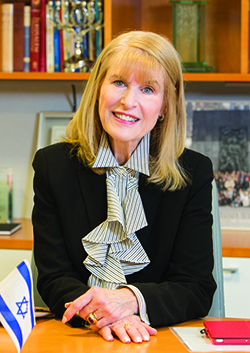Hadassah
President's Column
Answering the Call

Like all Americans, every time we observe the anniversary of 9/11, as we did last month, I remember exactly where I was and how I felt on that terrible day. The only difference is that in my memory I see double.
One month before September 11, 2001, I was in Jerusalem, where Hadassah was holding its national convention. Leaving Mount Scopus, where we had presented a quilt made by Young Judaea campers to HMO’s Pediatric Department, my colleague Judy Shereck and I stopped—briefly, we thought—at our hotel before resuming a busy schedule. As I reached my room the phone rang; it was the nephew of Renee Albert, my roommate, asking if his aunt was safe. That was how I heard about the suicide bombing that killed 15 people—including seven children and a pregnant mother—and injured 130 at the Sbarro pizzeria on Jaffa Road, a few blocks from our hotel.
I spent the next several hours with a group of women accounting for all the convention attendees, making sure they were safe (thankfully, they were). And engraved in my memory are the many concerned calls that came to us from loved ones in America.
On the morning of September 11, my husband and I took the train from Long Island into Manhattan and said goodbye at Penn Station. As I walked up Fifth Avenue toward Hadassah House, I noticed everyone looking toward me and up. I turned around and saw the smoke rising from the World Trade Center. Among the emotions I remember from that day was a sickening sense of déjà vu. And also a comforting feeling from calls that came from friends and family in Israel checking on my welfare.
Nearly 3,000 people died in the September 11 attacks on America. In Israel, the Sbarro bombing was part of a slow-motion 9/11—a five-year wave of terror that killed more than 700 civilians.
Terrorism has changed much of life’s rhythm, but it has also strengthened ties between two nations that evoke jealousy and rage from people threatened by our freedom and the prosperity it engenders.
The sense of shared vulnerability has further strengthened the eternal bonds that unite the Jewish people. In recent years, terrorists have killed Jews in Paris, Brussels and Copenhagen, in Mumbai, Istanbul and Casablanca. In the past year, they have also targeted American Jews. I was in Israel on the day Pittsburgh’s Tree of Life Congregation was attacked and became one of those calling from afar to check on friends. We were all devastated to learn that we lost members of the Hadassah family in Pittsburgh and also, six months later, in the assault on the Chabad Center in Poway, Calif. Any death by terrorism is a tragedy, but losing people we know or to whom we have personal connections brings it even closer to home.
Consolation is scarce in the worst of times, but Hadassah enables us to do more than grieve. During the wave of attacks in Israel between 2000 and 2005—and in subsequent years when deaths declined dramatically but never to zero—the Hadassah Medical Organization has treated and saved more terror victims than any other medical center in Israel. Our physicians have also shared their expertise with other nations facing mass casualties from both terrorism and natural disaster.
HMO’s work—frustrating terrorists, to be sure, but also saving lives from more conventional ailments—flows from our Zionism and our effort to help build a Jewish state that is a light unto the nations. HMO is a bridge not just between Jewish communities worldwide but also between Israel and the world.
Yes, we grieve when innocent victims suffer from violence—whether we know them personally or not. Our members still make those worried calls to the other side of the world or, depending on circumstances, receive them. But through Hadassah’s mission we also know that we are part of the solution, saving lives every day.
In this season of Jewish renewal and on the path to Thanksgiving, this is something for which we can all be grateful.










 Facebook
Facebook Instagram
Instagram Twitter
Twitter
Leave a Reply